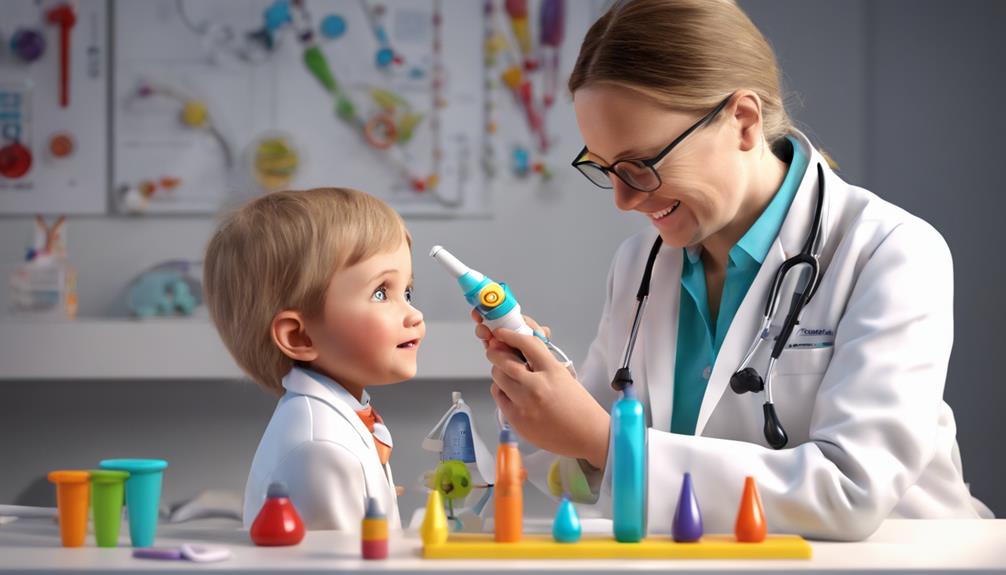Pediatrician Job Description
As a pediatrician, you'll complete undergraduate studies, medical school, residency, and licensing to care for children. Your duties include exams, diagnoses, prescriptions, and treatment plans. Building trust with patients and parents, you offer guidance on health, nutrition, and exercise in a supportive setting. Detail-oriented planning, collaborating with specialists, and health education empower families. Practice precise vaccinations, prescriptions, and preventative care. Communicate clearly, support parents, and work collaboratively with healthcare teams. Opportunities for growth include education, networking, and staying updated on advancements. Embrace this rewarding career where your care shapes the well-being of young lives.
Key Takeaways
- Conduct physical exams, diagnose illnesses, and prescribe medication.
- Establish trust with patients and parents, providing guidance on nutrition and exercise.
- Develop tailored treatment plans, coordinate care, and collaborate with specialists.
- Provide health education resources, promote parental involvement, and conduct community outreach programs.
- Stay updated on new treatment modalities, expand knowledge base, and ensure evidence-based care.
Educational Requirements
To become a pediatrician, you'll need to complete a rigorous educational journey that typically includes four years of undergraduate studies, followed by four years of medical school. After graduating from medical school, the next steps involve completing a residency program and obtaining the necessary licensing requirements to practice medicine independently.
Licensing requirements vary by state, but typically involve passing the United States Medical Licensing Examination (USMLE) and potentially additional exams specific to pediatrics. These exams guarantee that you have the knowledge and skills needed to provide quality care to young patients. Once you have obtained your medical license, you can begin practicing as a pediatrician.
Residency programs are an essential part of your training as a pediatrician. During your residency, you'll gain hands-on experience working with children under the supervision of experienced physicians. This is where you'll refine your clinical skills, learn about different pediatric specialties, and develop a deep understanding of child health and development. By completing a residency program, you'll be well-prepared to provide compassionate and expert care to children in your community.
Job Responsibilities
As a pediatrician, your job responsibilities include:
- Providing patient care duties such as conducting physical exams, diagnosing illnesses, and prescribing medication.
- Creating medical treatment plans tailored to each child's needs and coordinating care with other healthcare professionals.
- Educating patients and their families on preventive healthcare measures and promoting overall well-being.
Patient Care Duties
In the role of a pediatrician, your primary responsibility is to provide caring and thorough care to young patients. Pediatric patient communication and parent involvement are vital aspects of your job. You must establish trust with both the child and their parents, explaining medical information in a way that's easily understood and addressing any concerns they may have.
Monitoring child wellness and growth is essential to track their development accurately. Regular check-ups allow you to assess physical, mental, and emotional health, providing guidance on nutrition, exercise, and overall well-being. By fostering a supportive and empathetic environment, you contribute to the overall health and happiness of your young patients and their families.
Medical Treatment Planning
Ensuring thorough medical treatment planning is an essential aspect of your role as a pediatrician in providing holistic care to young patients.
You must develop treatment planning strategies tailored to each child's unique needs, utilizing a range of medical intervention techniques.
This involves not only prescribing medications but also coordinating with other healthcare professionals for holistic patient care.
By collaborating with specialists and caregivers, you can guarantee a cohesive approach to the child's well-being.
Additionally, providing families with access to health education resources empowers them to make informed decisions about their child's healthcare.
Your attention to detail in medical treatment planning plays a critical role in promoting the health and recovery of your young patients.
Health Education Provision
Providing families with access to health education resources empowers them to make informed decisions about their child's healthcare journey. As a pediatrician, you play an essential role in promoting parental involvement by offering guidance on various health promotion strategies.
By conducting community outreach programs, you can educate families about disease prevention, vaccination schedules, nutrition, and safety measures. Your knowledge and compassion help parents navigate through the complexities of pediatric healthcare, ensuring the well-being of their children.
Through effective communication and the provision of evidence-based information, you equip families with the tools they need to maintain their child's health and prevent illnesses. Your dedication to health education fosters a partnership between families and healthcare providers, ultimately leading to better health outcomes for children.
Patient Care Duties
With a focus on the well-being of young patients, your primary responsibility as a pediatrician is to assess, diagnose, and treat various medical conditions and illnesses.
Here are three essential patient care duties you'll undertake:
- Pediatrician Patient Engagement: Building trust and rapport with your young patients and their parents is important for effective treatment. Your ability to communicate clearly and empathetically will help ease any fears and promote open dialogue throughout the care process.
- Child Health Monitoring: Regularly monitoring the growth and development of children is essential in detecting any potential health issues early on. This includes tracking height, weight, developmental milestones, and conducting routine screenings to ensure your patients are thriving.
- Treatment Planning and Follow-Up: After diagnosing a medical condition, you'll create detailed treatment plans tailored to each child's specific needs. Following up with patients to assess their progress, adjust treatment as necessary, and provide ongoing support is crucial for promoting their well-being.
Diagnostic Skills Needed
To excel as a pediatrician, possessing sharp diagnostic skills is essential in accurately identifying and treating medical conditions in young patients. Conducting a thorough pediatric health assessment is the first step in the diagnostic process. This involves carefully listening to the patient and their caregivers, observing symptoms, and performing physical examinations. Differential diagnosis plays a pivotal role in distinguishing between similar conditions, ensuring accurate treatment planning tailored to each child's specific needs.
Pediatric care coordination is essential in collaborating with other healthcare professionals, such as specialists and therapists, to provide thorough care. As a pediatrician, you must be adept at interpreting lab results, imaging studies, and other diagnostic tests to formulate a holistic view of the patient's health. Your ability to synthesize this information is key in developing effective treatment plans that address not only the immediate symptoms but also the underlying causes. By honing your diagnostic skills, you can make a significant impact on the well-being of your young patients and their families.
Treatment Procedures
As a pediatrician, your treatment procedures encompass a wide range of medical exams tailored to children's unique needs. You must master vaccination administration techniques to guarantee the health and safety of your young patients.
Additionally, adhering to prescription writing guidelines is essential in providing accurate and effective treatment plans for children under your care.
Medical Exams for Children
During a medical examination for children, the pediatrician will carefully assess the child's physical health and development. This thorough evaluation is essential for ensuring the well-being of your child. Here are some key aspects that the pediatrician will focus on:
- Growth Monitoring and Developmental Assessment: The pediatrician will track your child's growth patterns, including height, weight, and head circumference. Developmental milestones such as speech, motor skills, and social interactions will also be evaluated.
- Behavioral Counseling: Addressing any behavioral concerns is a fundamental part of the examination. The pediatrician will provide guidance on managing behavioral issues and promoting positive behaviors.
- Nutrition Counseling: Proper nutrition is crucial for a child's growth and development. The pediatrician will offer advice on healthy eating habits and dietary requirements tailored to your child's needs.
Vaccination Administration Techniques
When administering vaccinations, precision and gentle technique are essential to guarantee the comfort and safety of the child. Vaccine safety and proper administration techniques are paramount in preventing the spread of diseases and ensuring the well-being of the pediatric population. As a pediatrician, it is vital to educate parents on the importance of vaccinations and address any concerns they may have. Providing parental support and guidance can help alleviate fears and increase vaccination compliance rates. Here is a table showcasing some key vaccination administration techniques:
| Dos | Don'ts |
|---|---|
| Use a new needle | Do not shake the vaccine |
| Clean the injection site | Avoid injecting into a blood vessel |
| Administer at the recommended age | Do not skip booster doses |
Prescription Writing Guidelines
To guarantee the effectiveness and safety of treatments, adhere closely to the prescription writing guidelines provided for accurate medication administration. When prescribing medications for your young patients, keep the following key points in mind:
- Medication Dosing and Safety: Guarantee precise dosing based on the child's weight and age to prevent under or overdosing, which can lead to adverse effects.
- Electronic Prescription Systems for Efficiency: Utilize electronic systems to streamline the prescription process, reducing errors and providing quick access for pharmacists and caregivers.
- Detailed Instructions: Include clear instructions for caregivers on how to administer the medication properly, emphasizing the significance of adherence to the prescribed regimen for best results.
Preventative Care Measures
Consistently prioritizing preventative care measures is vital in maintaining the health and well-being of pediatric patients. As a pediatrician, you play an important role in educating parents and caregivers about nutrition counseling to guarantee children receive the necessary vitamins and minerals for their growth and development. By offering advice on healthy eating habits, you empower families to make informed choices that contribute to overall well-being.
Moreover, monitoring childhood development milestones is essential in identifying any potential issues early on. Regular check-ups allow you to track a child's physical, cognitive, and emotional progress, enabling timely interventions if needed. Your expertise in recognizing developmental delays and providing appropriate support can have a significant impact on a child's future success.
Communication With Parents
Effective communication with parents is vital in fostering a collaborative and supportive relationship that benefits the health and well-being of pediatric patients. As a pediatrician, your interactions with parents play a pivotal role in providing the best care for their children. To enhance your communication skills, consider the following:
- Parent Communication Strategies: Utilize clear and jargon-free language when discussing medical information with parents. Encourage questions and active participation in the child's healthcare decisions to promote understanding and trust.
- Support Groups: Recommend local or online support groups for parents dealing with similar medical conditions or challenges. These groups can provide emotional support, shared experiences, and valuable resources to families.
- Building Trust, Addressing Concerns: Take the time to listen attentively to parents' concerns and validate their feelings. By establishing trust and addressing worries promptly and respectfully, you can strengthen the partnership between caregivers and healthcare providers.
Collaboration With Healthcare Team
Collaborate closely with your healthcare team to guarantee holistic and coordinated care for pediatric patients. By fostering strong team dynamics and engaging in interdisciplinary collaboration, you can enhance patient outcomes and guarantee the delivery of all-encompassing care. Effective communication and mutual respect among team members are essential for providing high-quality healthcare to children.
Working collaboratively with nurses, specialists, therapists, and other healthcare professionals, you can leverage each team member's expertise to create personalized treatment plans tailored to the specific needs of young patients. This interdisciplinary approach not only improves patient outcomes but also promotes healthcare efficiency by streamlining processes and avoiding duplicative tests or treatments.
Regular team meetings, case discussions, and shared decision-making further strengthen collaboration within the healthcare team. By actively participating in these interactions, you contribute valuable insights and perspectives that contribute to the overall well-being of your pediatric patients. Embracing a collaborative approach not only benefits the children under your care but also fosters a supportive and cohesive work environment among healthcare professionals.
Administrative Tasks
To effectively manage the administrative tasks associated with pediatric care, prioritize organization and attention to detail in your daily practice. As a pediatrician, your ability to handle administrative duties efficiently is important for providing excellent care to your young patients. Here are three key aspects to keep in mind:
- Time Management: Efficiently scheduling appointments, managing medical records, and ensuring timely follow-ups are essential for smooth operations in your practice. Prioritize tasks based on urgency and importance to optimize your time and provide the best care for your patients.
- Team Collaboration: Working closely with nurses, medical assistants, and administrative staff is important for effective coordination in pediatric care. Foster open communication, delegate tasks appropriately, and recognize the value of each team member's contributions to streamline administrative processes.
- Documentation Accuracy: Maintaining precise and up-to-date medical records is essential in pediatric care. Make sure that all patient information, treatment plans, and follow-up details are accurately documented to facilitate continuity of care and enhance overall patient outcomes.
Continuing Education
As a pediatrician, it's essential to keep up with ongoing training requirements to ensure you provide the best care for your young patients. Professional development opportunities, such as conferences and workshops, offer valuable insights into new medical advancements and best practices.
Staying updated on the latest research and guidelines is important to delivering high-quality healthcare to children and their families.
Ongoing Training Requirements
Ensuring your knowledge and skills are up-to-date, ongoing training requirements for pediatricians include participating in continuing education programs. Staying current is essential in the ever-evolving field of healthcare.
Here are three key aspects to take into account:
- Certification Requirements: Regular participation in training programs is vital to meet certification standards and maintain licensure.
- Pediatrician Skills: Continuing education offers opportunities to enhance your diagnostic, treatment, and communication skills, ensuring you provide the best care to your young patients.
- Development Opportunities: Engaging in ongoing training allows you to stay informed about the latest medical advancements and best practices in pediatric care, ultimately benefiting both you and the children under your care.
Professional Development Opportunities
Explore various professional development opportunities through continuing education to enhance your pediatric skills and stay current in the ever-evolving field of healthcare.
Engaging in continuing education programs not only allows for career advancement but also provides valuable networking opportunities within the pediatric community.
By participating in workshops, seminars, and conferences, you can deepen your knowledge, learn about the latest advancements in pediatric care, and refine your clinical skills.
These opportunities offer a platform to connect with other healthcare professionals, exchange ideas, and build relationships that can further enhance your practice.
Stay proactive in seeking out these development avenues to broaden your expertise, improve patient care, and contribute positively to the pediatric healthcare landscape.
Importance of Staying Updated
To stay at the forefront of pediatric care and guarantee the best outcomes for your young patients, it's essential to actively engage in continuing education opportunities. Staying informed about the latest research and medical advancements is critical for providing excellent care. Here are three reasons why staying updated through continuing education is essential:
- Enhanced Patient Care: By staying informed about the latest research, you can incorporate new treatment modalities and protocols into your practice, leading to improved patient outcomes.
- Professional Growth: Continuing education allows you to expand your knowledge base, stay current with best practices, and enhance your skills, ultimately boosting your professional development.
- Ethical Responsibility: Keeping abreast of medical advancements ensures that you're providing your patients with the most effective and evidence-based care, fulfilling your ethical duty as a healthcare provider.
Frequently Asked Questions
What Are the Typical Work Hours for Pediatricians?
You'll find pediatricians working long hours, including night shifts and weekends. They often have on-call responsibilities, being available to provide care whenever needed. It's a demanding but rewarding profession that requires dedication.
How Do Pediatricians Handle Difficult or Non-Compliant Patients?
When faced with challenging patients, pediatricians rely on their exceptional communication skills and behavioral management strategies. By actively involving parents, providing patient education, and showing empathy, they navigate tough situations with care and expertise.
Are Pediatricians Required to Carry Malpractice Insurance?
Yes, as a pediatrician, you are required to carry malpractice insurance. This insurance provides you with liability protection in case of legal claims. While it has cost implications, it is an essential legal requirement for your practice.
Do Pediatricians Specialize in Certain Medical Conditions or Age Groups?
You might wonder, do pediatricians specialize? Absolutely! Pediatricians focus on specific medical conditions or age groups. Some specialize in areas like cardiology or neonatology, while others concentrate on particular age ranges, ensuring expert care.
How Do Pediatricians Stay Current With Advancements in Medicine?
To stay current with advancements in medicine, you engage in Continuing Education programs and attend Medical Conferences. These opportunities provide valuable insights, updates, and networking opportunities that enhance your knowledge, skills, and patient care practices.
Conclusion
As a pediatrician, you play a vital role in the health and well-being of children.
Did you know that pediatricians diagnose and treat a wide range of illnesses and injuries in children, from common colds to chronic conditions?
By providing compassionate care, detailed attention, and staying up-to-date on the latest medical advancements, you can make a significant impact on the lives of your young patients and their families.
Keep up the great work!







